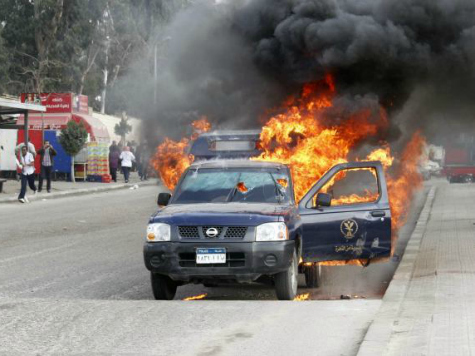Mr. Abdul Fattah Sisi has run a quiet election campaign. The former Egyptian general and Minister of Defense rose to prominence after siding with the protest by 33 million Egyptians that toppled the Muslim Brotherhood rule of Muhammad Morsi. Sisi is now expected to be elected to the nation’s highest office.
Though campaign posters for Sisi are common, he himself has made few public appearances, with several events canceled over security concerns stemming from Islamist militants affiliated with the Muslim Brotherhood and al Qaeda. This insecurity is not unfamiliar to Egyptians; an assassin affiliated with the Brotherhood killed President Anwar Sadat in 1981 for the crime of making peace with Israel.
While some decry the interim government’s heavy-handed approach towards the Brotherhood, the MB have made it very difficult for Egypt to progress toward democracy. Sisi is seen by many in Egypt as a hero for having rescued the nation from the Muslim Brotherhood and responding to the al Qaeda and Muslim Brotherhood-linked terrorists responsible for numerous attacks since Morsi was removed. A common refrain heard among Egyptians is that the Muslim Brotherhood were not interested in supporting the nation of Egypt but instead establishing a theocractic caliphate.
Sisi is expected to easily win against Hamdeen Sabahi, a leftist candidate who favors a strong state role in the Egyptian economy. Expat voting ended May 19th, with Sisi winning 94.5% of votes cast. The election will be held over May 26th and 27th, and results are expected between June 1st and 3rd. The government has offered to release all but 300 Muslim Brotherhood members from prison in exchange for the Brotherhood’s participation in the democratic process, but the Islamist movement continues to demand the reinstatement of Morsi and the execution of generals and politicians responsible for their removal from power, all while embracing a rhetoric of jihad and martyrdom.
Instead of participating in a democracy that leaves space for Christians and non-Islamist Egyptian Muslims, the Muslim Brotherhood and its ideological affiliates have embraced violence, not merely violent rhetoric. On Monday, May 19, three policemen were killed by gunmen just outside Al Azhar University, one of the world’s oldest Muslim institutions of learning and the most important Sunni theological authority.
Last Saturday four people were injured by an explosive device set off at a rally for Sisi in the Ezbet El-Nakhl neighborhood of Cairo, one of Cairo’s poorer, largely Christian districts, and earlier this month Sisi announced that two attempts on his life had been stopped.
Sisi has not been the only target. Egypt’s Interior Minister announced Wednesday that the country had foiled several high-level assassination plots organized by the Brotherhood, including attempts to kill not only the interim president, but the Minister of Defense, Minister of Interior, and several high-ranking members of Egypt’s police force. The greatest test of Egypt’s domestic security since the Islamists were deposed with the support of the population will come this week as the ancient country of Egypt attempts its second ever free election.
The Council for Global Security is a Washington-based non-profit organization that support democracy, prosperity and the protection of minorities in the in the Middle East.

COMMENTS
Please let us know if you're having issues with commenting.